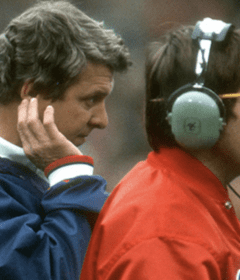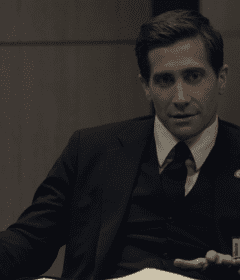Pepsi Just Cares About Making a Buck
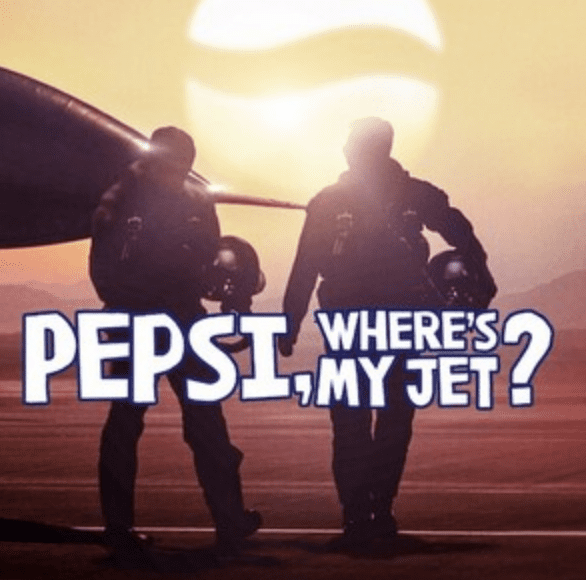
Pepsi Just Cares About Making a Buck – Ah yes, the ’90s: an era before smartphones, social media and the algorithm.
Television advertising was hitting its stride, and celebrity endorsement had more impact on what we consumed than ever before.
Enter Pepsi and its celeb-soaked advertisements, which were considered among the most groundbreaking, culture-making commercials of their time.
Still, the brand couldn’t seem to compete with Coke, which consistently outperformed Pepsi in taste tests nationwide.
That’s when Pepsi decided to do something bigger than it had ever done before — and for a brand so powerful, what could possibly go wrong?
Pepsi Just Cares About Making a Buck – The new docu-series Pepsi, Where’s My Jet? tells the story of Pepsi’s ambitious campaign, a multimillion-dollar fighter jet and a teenage boy who decided to take on one of the largest corporations in America.
Pepsi Just Cares About Making a Buck – What Happened in Leonard vs. PepsiCo?
The story of Pepsi, Where’s My Jet? began in 1996 with the release of an unprecedented marketing campaign in which consumers could exchange labels ripped from purchased Pepsi products for “Pepsi Stuff,” including sunglasses, leather jackets and, one ill-conceived Super Bowl commercial later, a fighter jet.
Millions of people watching at home saw the advertisement, which claimed that for only 7 million Pepsi points — the equivalent of $700,000 — you could win a Harrier Jump Jet (which costs $32 million).
No disclaimer was put on the ad.
However, a similar ad was run in Canada with a disclaimer.
And, Pepsi, after the fact, changed the number of point to redeem for the Harrier jet.
How Judge Kimba Wood turns both eyes on justice: She declined depositions from Pepsi executive and the people that created the add – I guess in the spirit of due diligence or maybe she had a massage scheduled. She refused a jury trial.
One of the creative heads admits that Pepsi changed the ad from 700,000,000 points to 7M because they thought it was too hard to read. He went on to say that he believed Pepsi was in the wrong.
However, Kimba slanted the trial so Pepsi could sweep the blunder under the rug and not pay out. Pepsi has a history of this type of behavior. Pepsi, the wrong generation.
Pepsi Just Cares About Making a Buck – Did Pepsi Actually Offer a Harrier Jet for 7 Million Points?
Pepsi executives assumed the astronomical amount of points required to obtain the jet would make it impossible for anyone to actually drink that much Pepsi and win the prize.
However, they didn’t plan for one intrepid teenager named John Leonard to figure out a catch in their over-the-top offer, and Pepsi, Where’s My Jet tells the twisty, thrilling story of what happened when he did.
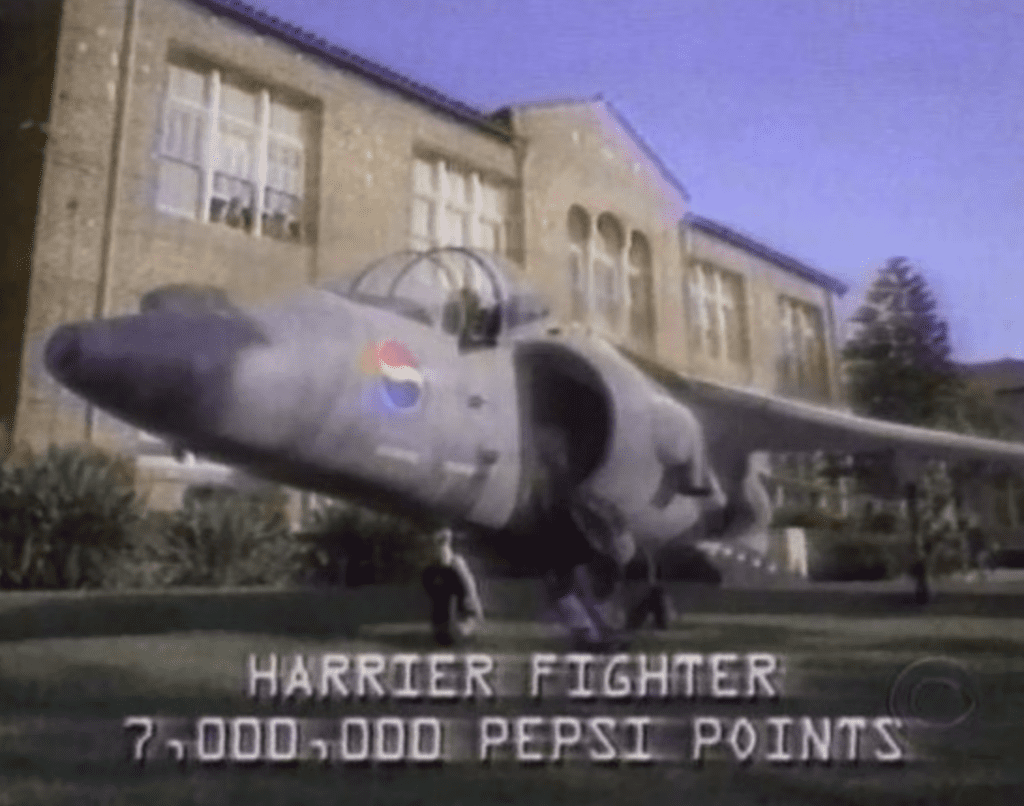
Pepsi Just Cares About Making a Buck – Harrier Fighter 7,000,000 Pepsi Points
The age-old story of the fight between a massive corporation and a teenager who just wanted his plane.
Pepsi, Where’s My Jet Is a four-part series directed by Andrew Renzi and executive produced by Andrew Renzi, Andrew Corkin, Nick Boak, Theo James, Andrew Fried, Jordan Wynn, Dane Lillegard and Sarina Roma.
The soda company not only failed to put a disclaimer on its now-iconic advertisement, it also didn’t realize that someone could actually collect the required 7 million points and try to redeem them for a plane valued at more than $30 million.
The plaintiff did not collect 7,000,000 Pepsi Points through the purchase of Pepsi products, but instead sent a certified check for $700,008.50 as permitted by the contest rules.
Leonard had 15 existing points, paid $0.10 a point for the remaining 6,999,985 points, and a $10 shipping and handling fee
Pepsi Just Cares About Making a Buck & Choked
Pepsi Just Cares About Making a Buck – – You sense that Pepsi is still embarrassed by the skirmish.
The fight for the jet did the company no favors whatsoever.
At the time it was still locked in the “Cola Wars” with Coca-Cola – a ruthless scrap for dominance that saw Pepsi introduce blind taste tests to prove its superiority to the world – and any slip-up could have been fatal.
Here was a brand selling itself on how cool and youthful it was, but it responded to Leonard’s claim by – spoiler alert – slamming him with teams of corporate lawyers.
When TV companies saw what an open, guileless boy Leonard was, asking politely for his jump jet, he was suddenly everywhere.
Pepsi Just Cares About Making a Buck – It was a terrible PR move from Pepsi, and Hoffman is still convinced that its self-inflicted damage lingers.
John was the all-American kid – a typical Pepsi drinker.
He was the Pepsi generation.
And that’s kind of what’s ironic, too.
Pepsi blew a great opportunity to lasso this kid.
Pepsi could have taken turned this mistake on their part to a huge positive by offering to take the kid around the country in the Harrier jet for the next year and pay him a salary.
Pepsi Just Cares About Making a Buck – – Instead, Pepsi went on the offensive and initiated a lawsuit against a 20 year old for trying to claim a prize that Pepsi executives and BBDO executives offered without thinking it through.
Pepsi Just Cares About Making a Buck – Pepsi & Their Ad Agency Have a History of Screwing Up
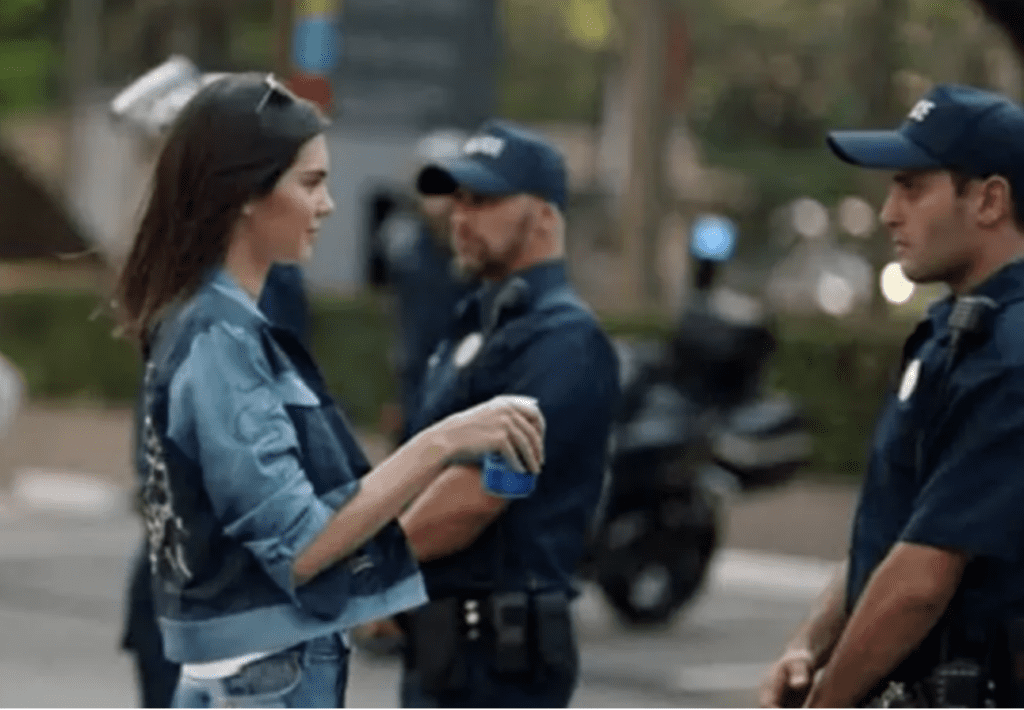
Pepsi Just Cares About Making a Buck – Pepsi Kendal Jenner Ad Trivializes Protests
Even massive companies like Pepsi aren’t immune to a little PR disaster now and then.
The beverage giant found itself in trouble in early 2017 when it released an advertisement starring Kendall Jenner.
In the commercial, Jenner leaves a photo shoot, joins a protest, and seemingly unites everyone with a can of Pepsi.
Many activists criticized the ad for trivializing and exploiting social justice movements such as Black Lives Matter, and it received further condemnation when Martin Luther King Jr.’s daughter tweeted “If only Daddy would have known about the power of #Pepsi.” Pepsi eventually apologized and pulled the commercial.
I’m sure everyone reading this article remembers when back in 2017, Pepsi launched a protest-centric advertisement campaign with Kendall Jenner.
Around that time, the U.S. witnessed many protests against former President Donald Trump and rallies in support of the Black Lives Matter Movement.
The ad showed Jenner leaving a photoshoot halfway to join a protest.
The protestors reach a spot where they are head-to-head with the police, and Jenner then defuses the tension between the police and the protesters by offering a police officer a can of Pepsi.
Soon after its release, people began criticizing the ad saying that Pepsi was trying to co-opt the movement to increase its sales.
A Twitter user tweeted, “If a black girl tried to give a cop a Pepsi in a protest march, I’m pretty sure he’d give her a Dr Pepper spray in return,” referring to the use of pepper spray to deter protesters. Some responded sarcastically—a Twitter user posting a picture of Dr. Martin Luther King being escorted away and captioning, “Now just wait one second officers…I have a Pepsi.”
Amid all the backlash, Pepsi apologized and took down the advertisement.
It took the brand nine months to recover from the negative brand image this advertisement had built for them.
The purchase consideration for Pepsi among millennials went down from 27% in early April (around when the advert came out) to 24% by mid-July, recovering to 29% when Pepsi released a new seasonal drink flavor in November.
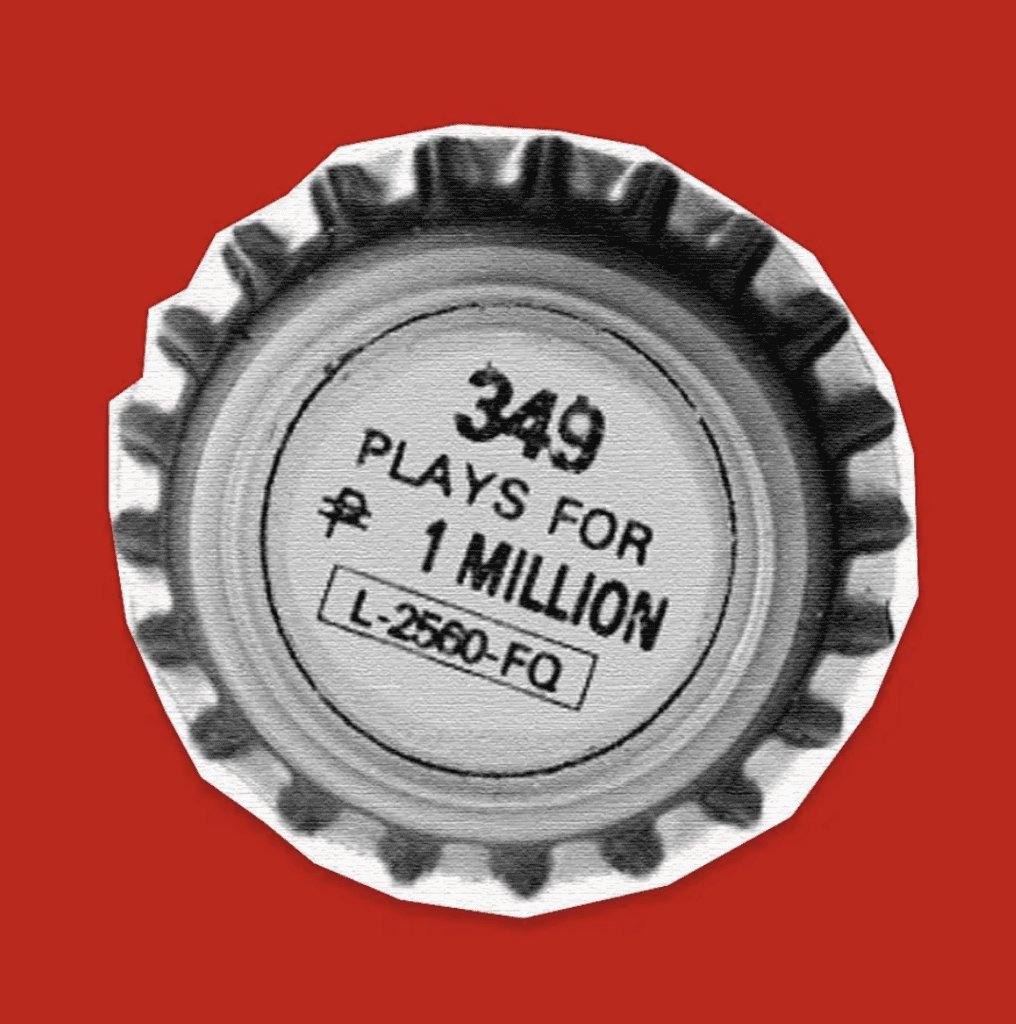
Pepsi Just Cares About Making a Buck – The Marketing Mistake That Made Pepsi Go on a Full-Fledged War With a Country
A case study of one of the most infamous marketing strategies gone wrong.
Pepsi Just Cares About Making a Buck – It all started in 1992 when Pepsi decided to launch a new marketing campaign in the Philippines.
It was the 12th largest market for soft drinks in the world, with a population that loved carbonated drinks.
However, Pepsi was a distant second to Coca-Cola in terms of reach to consumers.
Coca-Cola had a 75% market share while Pepsi had only 17%.
Pepsi had always been brainstorming on new ideas to market the brand, albeit with lesser efficiency than they would have hoped.
1989 had seen the launch of Pepsi A.M. which was marketed as an alternative to coffee but it did not go as well as they had planned.
So in an attempt to try something bigger and better, they targeted a more populous country with a more ambitious project.
This gave birth to the ‘Number Fever’ in the Philippines which was revolutionary, just not in the sense of the word that Pepsi would have liked.
The idea was simple.
Every bottle of Pepsi and its affiliate brands like Mountain Dew and 7-Up had a 3 digit number printed on the back of the cap.
It was similar to a lottery system in which the winning number was announced on national television and prizes were given to people starting from 100 Indonesian Pesos (about $5).
The grand prize was 1 million pesos, which was a huge attraction for a large number of common citizens in the developing country.
The entire campaign functioned on the basic plan of having two winners who would get the grand prize of $40,000 each.
The winning number was pre-decided to be ‘349’ and these two bottles of Pepsi would be shipped to the Philippines by the company itself.
But the entire plan went haywire when a glitch caused the vendors in the Philippines to manufacture 800,000 bottles with the winning number printed on their cap.
Unbeknownst to this error, Pepsi continued pushing the campaign and on the ill-fated day of the announcement of the grand prize, there were 490,116 Filipinos who claimed the prize, armed with their bottles bearing the number ‘349’.
Pepsi’s original budget for the Number Fever was $2 million, but with this costly mistake, they were now in a fix, owing $32 billion to their customers.
Consequently, the company refused to pay all the claimants, citing a glitch in their supply management, and instead, offered to pay all of them $18 each.
Pepsi Just Cares About Making a Buck – This would have also increased their budget to $8.7 million, but it was not acceptable to the people, eager as they were, to win the huge prize in return for consuming all the carbonated drinks over the past months.
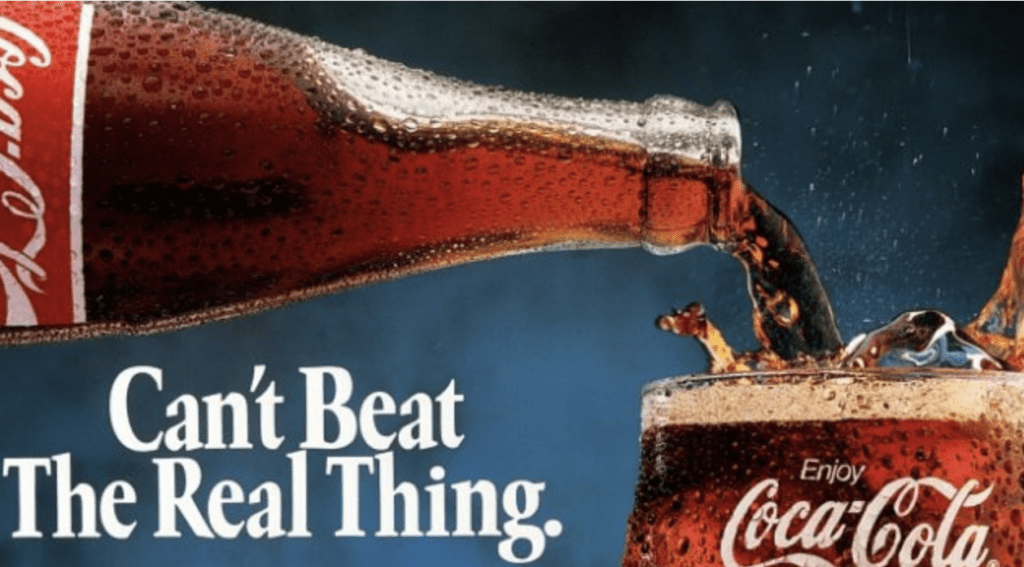
COKE, The Real Thing
Watch The Good Nurse on Netflix >>
Watch Line of Duty on BritBox >>

